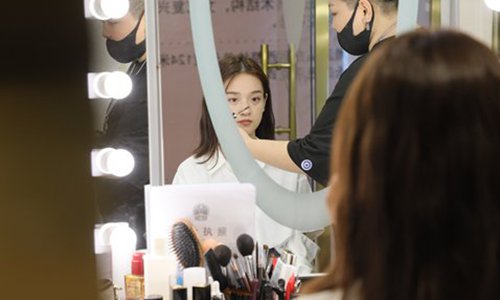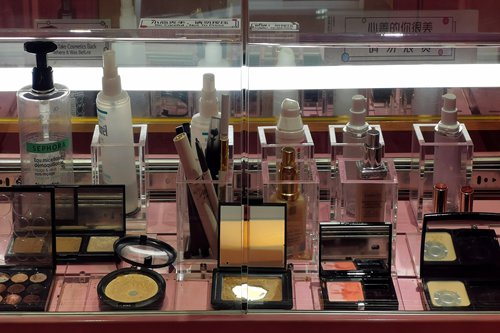HOME >> METRO SHANGHAI
Shared makeup booths a new trend
By Qi Xijia Source:Global Times Published: 2019/10/9 15:28:40
Quick furbish

A staff makes up for a customer at a booth in Shanghai. Photo: Courtesy of Plus Beauty

Cosmetics put in order in a self-service booth Photo: VCG
"With just 28 yuan ($3.92) you can use all of the big cosmetic brands," read the promotion of a shared makeup booth in downtown Shanghai. Following shared bicycles, shared cars, and shared phone chargers now shared makeup booths for public use are the latest trends in the sharing economy. Over the past years, Shanghai has seen several top brands venturing in the shared makeup arena. Many such booths have been sprouting in business complexes and malls. Some are self-serviced while others offer personalized services by professional artists.
On the last day of the National Day holiday, makeup artists of Plus Beauty makeup booth in a mall in Jing'an district had an utter busy day styling the customers. During the past one year, 20 such booths of Plus Beauty have sprouted across Shanghai's downtown.
Measuring about 4 square meters, these booths are stocked with products such as Lancome foundation, Givenchy eye shadow and Armani lipstick. Operating on a membership system, customers can book the makeup artist in advance, and enjoy the makeup session which lasts about 30 minutes to an hour.
Booming business
Equivalent to a mini beauty and hair salon it offers eyebrow design, skin cleansing, hair styling, nail care, and personalized professional makeup services. A 1,000 yuan membership offers 15 sessions in total while an annual membership stands at 3,650 yuan.
The reservation is on the rise, Fu Jiaying, the founder and CEO of Plus Beauty told the Global Times.
"Currently we have 10,000 members. Since our launch last August we have provided over 30,000 services to customers, with each booth receiving 10 to 15 customers daily," said Fu who previously had a 10-year stint in the PR industry specializing in wedding planning and fashion.
17 Beauty Box is another such brands in the beauty sharing industry. Unlike Plus Beauty, the company's booths are all self-service. Customers can scan a QR code, pay 28 yuan, and use the cosmetics in the booth for 15 minutes.
Both the self-service and customized modes are targeted at consumers who might not have the convenience of wearing makeup themselves during significant occasions. While 17 Beauty Box offers consumers a relatively private space to fix their makeup in public places during urgent cases, Plus Beauty focuses on the need for makeup on special social gatherings, convenience, and services.
"It is estimated that in the first-tier cities people need to network during social gatherings almost twice a month, such as attending birthday parties or weddings, where good looks matter a lot. It is like, you cook at home on a daily basis but you dine in a restaurant on special occasions," said Fu.
According to Fu, their target clients are working professionals in the 25 to 35 age-group, for whom good looks and networking during social congregations are requisites; however, they lack the time and technique to wear makeup themselves. Others are those in their early 20s who are eager to learn makeup skills from a professional artist.
"You can find such kinds of outlets in major downtown malls in the city. So, it is quite convenient to mend your appearance before you go and meet someone important," Zhou Zhou, who has an annual membership of Plus Beauty, told the Global Times.
"I don't wear makeup in daily life and I am not quite skilled at it. These booths really helped to solve this problem when I have to wear makeup on certain occasions. The cost of each service is about 60 yuan with the membership, which is affordable for me. All you need to do is just sit there, relax, and you are served like a TV star," Chen Qi, another member told the Global Times.
Hygiene concerns
However, some consumers are still hesitant about this new trend. A big concern for them is the hygiene factor as the cosmetics are shared among numerous individuals. The Global Times noticed that though in certain booths disposable items like power puff and makeup cotton are used, yet when it comes to certain brushes it is shared among multiple customers to cut cost.
"I don't think everything can be shared. You have no idea who has used the brushes before. It relies largely on the companies to keep their products safe and clean. It still remains to be seen whether this business model can last," one netizen commented online.
Addressing this problem Fu claimed that they follow strict procedures for sterilizing reusable tools after every use.
Chinese people are paying more attention to their looks. According to Qianzhan Industry Research Institute, China overtook Japan to become the second-largest cosmetic consumption country in 2013. By the end of 2018, China's cosmetic retail sale has reached 261.9 billion yuan and is expected to surpass 400 billion yuan by 2023.
Delving on whether this new shared-cosmetic trend can be in rigid demand among consumers, marketing expert Jiang Xiaofeng believes such business model may only be limited to those who are in an urgent need to apply cosmetics. Jiang added that for consumers who are regular cosmetic users, usually have a preferred brand and carry the cosmetics with them. Besides, they would not be willing to share it with others.
Posted in: METRO SHANGHAI